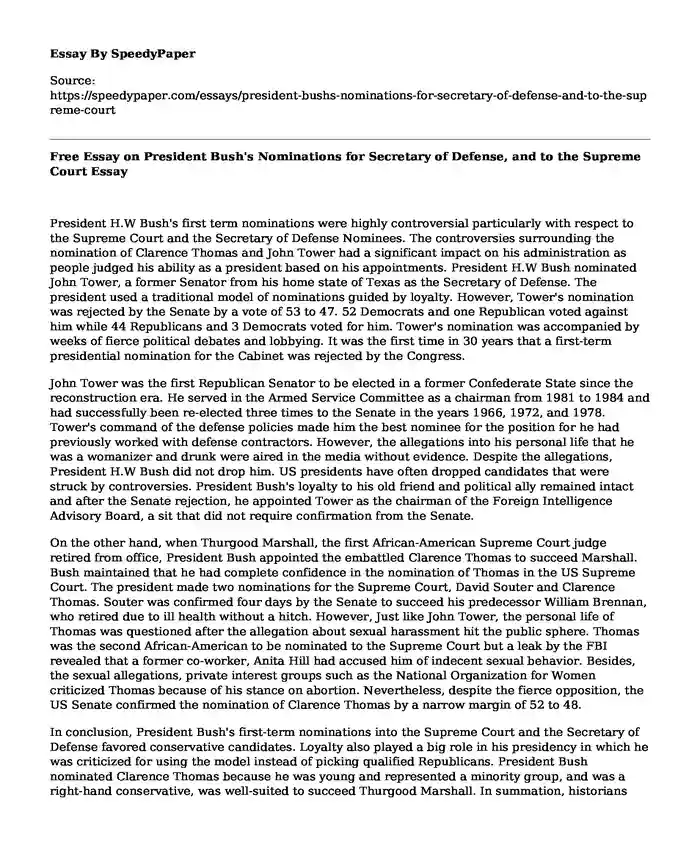President H.W Bush's first term nominations were highly controversial particularly with respect to the Supreme Court and the Secretary of Defense Nominees. The controversies surrounding the nomination of Clarence Thomas and John Tower had a significant impact on his administration as people judged his ability as a president based on his appointments. President H.W Bush nominated John Tower, a former Senator from his home state of Texas as the Secretary of Defense. The president used a traditional model of nominations guided by loyalty. However, Tower's nomination was rejected by the Senate by a vote of 53 to 47. 52 Democrats and one Republican voted against him while 44 Republicans and 3 Democrats voted for him. Tower's nomination was accompanied by weeks of fierce political debates and lobbying. It was the first time in 30 years that a first-term presidential nomination for the Cabinet was rejected by the Congress.
John Tower was the first Republican Senator to be elected in a former Confederate State since the reconstruction era. He served in the Armed Service Committee as a chairman from 1981 to 1984 and had successfully been re-elected three times to the Senate in the years 1966, 1972, and 1978. Tower's command of the defense policies made him the best nominee for the position for he had previously worked with defense contractors. However, the allegations into his personal life that he was a womanizer and drunk were aired in the media without evidence. Despite the allegations, President H.W Bush did not drop him. US presidents have often dropped candidates that were struck by controversies. President Bush's loyalty to his old friend and political ally remained intact and after the Senate rejection, he appointed Tower as the chairman of the Foreign Intelligence Advisory Board, a sit that did not require confirmation from the Senate.
On the other hand, when Thurgood Marshall, the first African-American Supreme Court judge retired from office, President Bush appointed the embattled Clarence Thomas to succeed Marshall. Bush maintained that he had complete confidence in the nomination of Thomas in the US Supreme Court. The president made two nominations for the Supreme Court, David Souter and Clarence Thomas. Souter was confirmed four days by the Senate to succeed his predecessor William Brennan, who retired due to ill health without a hitch. However, Just like John Tower, the personal life of Thomas was questioned after the allegation about sexual harassment hit the public sphere. Thomas was the second African-American to be nominated to the Supreme Court but a leak by the FBI revealed that a former co-worker, Anita Hill had accused him of indecent sexual behavior. Besides, the sexual allegations, private interest groups such as the National Organization for Women criticized Thomas because of his stance on abortion. Nevertheless, despite the fierce opposition, the US Senate confirmed the nomination of Clarence Thomas by a narrow margin of 52 to 48.
In conclusion, President Bush's first-term nominations into the Supreme Court and the Secretary of Defense favored conservative candidates. Loyalty also played a big role in his presidency in which he was criticized for using the model instead of picking qualified Republicans. President Bush nominated Clarence Thomas because he was young and represented a minority group, and was a right-hand conservative, was well-suited to succeed Thurgood Marshall. In summation, historians should view the loyalty of President Bush to Thomas and Tower as the cause for his first-term presidency rule because it undermined his leadership capabilities.
Bibliography
Bowen, Michael. 2016. "41: Inside The Presidency Of George H. W. Bush. By Michael Nelson And Barbara A. Perry, Eds." Oral History Review 43 (1): 206-208. Doi:10.1093/ohr/ohw005.
Nelson, Michael, and Barbara A Perry. 2014. 41: Inside The Presidency Of George H. W. Bush, "Character and Consequence: The John Tower Confirmation Battle." Cornell University Press.
Nelson, Michael, and Barbara A Perry. 2014. 41: Inside The Presidency Of George H. W. Bush, "From Oral History to Oral Argument: George Bush's Supreme Court Appointments." Cornell University Press.
Strong, Robert A. "5. Character and Consequence: The John Tower Confirmation Battle." 41, 2017. Doi:10.7591/9780801470820-011.
Cite this page
Free Essay on President Bush's Nominations for Secretary of Defense, and to the Supreme Court. (2022, Jun 08). Retrieved from https://speedypaper.net/essays/president-bushs-nominations-for-secretary-of-defense-and-to-the-supreme-court
Request Removal
If you are the original author of this essay and no longer wish to have it published on the SpeedyPaper website, please click below to request its removal:
- Essay Example My Strange Addiction
- Essay Samples on Strategic Planning in Higher Education
- Essay Sample on Communication Between the Nurse Practitioner and the Family
- Free Essay on Why Was the Renaissance Era Most Interesting
- Business Essay Sample: Effect of Social Media Marketing on Success of SMEs
- Free Essay with the Case Studies of Legal and Ethical Issues in Healthcare
- Essay Example on Social Support and Productive Aging
Popular categories





